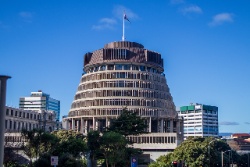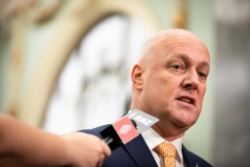New Zealand Medical Lab Workers Strike Again Over Low Wages
By Tom Peters
More than 1,000 medical laboratory workers in New Zealand held 24-hour strikes on November 17 and 20, with workers in different parts of the country striking on different days.
The workers, including scientists, technicians, and phlebotomists, have held several one-day stoppages since rejecting a derisory 5 percent pay offer in July from Awanui Labs, a private company that operates about 70 percent of the country’s laboratory testing for the public health system.
Awanui workers identify disease and abnormalities through studying blood, tissue and other bodily samples. They play an essential role in the treatment of cancer and many other conditions. Despite this, the laboratory technicians receive little more than the legal minimum wage of $22.70 an hour. According to the union, APEX, there is a 30 percent pay gap with workers employed directly by the public system doing the same work.
Awanui workers received a 6 percent pay increase spread across three years, from 2019 to 2022—well below the increased cost of living. According to the Reserve Bank, inflation rose by 13 percent from mid-2019 to mid-2022. In the past year, workers’ real disposable incomes have fallen even more sharply: in the year to September 2023, inflation went up around 6 percent and food prices have increased 8 percent.
The Labour Party-led government lost the election in October by a landslide amid deepening social inequality and deeply entrenched poverty. The healthcare system is severely rundown, understaffed and overcrowded, prompting repeated strikes by doctors, nurses and other healthcare workers over the past six years.
Labour’s decision to scrap all public health measures to mitigate COVID-19 has contributed to the crisis in public hospitals, with hundreds of people being hospitalised and about 20 dying every week from the coronavirus.
The National Party is in talks with the far-right ACT and NZ First parties to form a new coalition government. All three parties, as well as Labour, campaigned with promises to slash spending across government departments—which will inevitably impact healthcare, education and other vital services. ACT, in particular, is pushing for greater privatisation of healthcare services as a means to cut costs and open up new opportunities for profit-making.
Speaking with the World Socialist Web
Site at the Wellington Hospital picket last Friday, a lab
technician manager with 22 years’ experience explained
that she was still only paid $28 an hour. “It’s very
stressful. I have a family and my wage basically covers my
rent, so if I didn’t have a partner, I’d be screwed. I
have $20 left over from my pay once I’ve paid my
rent.”
She described the job as “a high stress environment. You’re busy from the minute you get to work in the morning until you leave.” Because of high staff turnover, “in the department I work in we are recruiting all the time,” which places significant pressure on the workforce because of the time needed to train new staff.
Ben, who has been in the job for two years, made just above the minimum wage. “It’s very tough. My wife has a medical condition, she’s had to stop working. Our daughter is just about to turn two.” They had been forced to seek assistance from the government’s social welfare agency, Work and Income.
Ben said the privatisation of services, supported by Labour and National governments, reminded him of the US healthcare system. Awanui had achieved a near-monopoly status with a “stranglehold” on the country’s medical laboratories. He called on the government to “wake up to what their choices have done” and recognise that “what we do is integral: if there’s no testing, there’s no diagnosis.”
He noted that Awanui had recently undergone a multi-million-dollar rebranding and returned a $43 million payout to its shareholders last year. The company is owned by the government’s superannuation fund, the Ontario Teachers’ Pension Plan (from Canada) and Te Pūia Tāpapa, an investment fund controlled by several Māori tribal corporations.
Ben said it left “a foul taste in your mouth when you’re seeing all these big numbers thrown around and you’re making the minimum wage. Even people who are doing super stressful roles, working from 11.00pm to 7.00am and they’re basically alone in the lab in their divisions trying to keep everything rolling.”
David Munro, an APEX representative, told Radio NZ that pay rates were “so low that we’ve had an experienced scientist in Invercargill leave to become a meat packer,” and there was a serious staffing problem. He said negotiations with Awanui had been “painfully slow,” with only four meetings between the union and the company since workers rejected the initial offer.
Over the past six years the Labour government has relied on the various healthcare unions to keep industrial action to a minimum and prevent a unified and sustained wages movement.
After 5,500 senior doctors and dentists held part-day strikes in September, further strike action planned for October was cancelled by the union, the Association of Salaried Medical Specialists (ASMS). On November 8, ASMS announced it would recommend that its members accept a settlement negotiated with the government’s Employment Relations Authority.
The details of the proposal have not been made public, but ASMS executive director Sarah Dalton admitted to Radio NZ that the union’s claim for a pay increase that barely meets inflation, was “pretty conservative.” She declared that this was because of “the climate that we’re in.”
Workers should reject such efforts to attack their wages and conditions based on spurious claims from the government, private companies and the unions that there is “no money” in the current “climate.”
Over the past three years the Labour government has handed over billions of dollars to corporations and the banks to prop up their profits. It has found billions more to upgrade the military and expand the intelligence agencies, as the country supports US imperialist aggression against Russia, China and other countries.
The incoming National-led government will accelerate the austerity drive to force workers to pay for the worsening economic crisis and increased militarisation. As the working class enters into struggle, it will need to build new organisations—controlled by workers themselves, not the pro-capitalist union bureaucracies—to fight back.
The Socialist Equality Group calls on healthcare workers to build rank-and-file workplace committees to fight for the broadest possible action and to forge links with teachers, transport workers, postal workers and many others who confront the same attacks on their wages and conditions.
The socialist demand must be made for the Awanui and all other private companies involved in the health system to be placed under public ownership and democratic workers’ control. Their profits must be redistributed to fund a vast expansion of healthcare services, with high wages for all workers. We urge healthcare workers to contact us to discuss the way forward.
Original url: https://www.wsws.org/en/articles/2023/11/22/moel-n22.html


 Jane Kelsey: How The Fast-Track Law Could Expose Future NZ Governments To Trade Disputes
Jane Kelsey: How The Fast-Track Law Could Expose Future NZ Governments To Trade Disputes Gordon Campbell: On unemployment, Winston Peters’ low boiling point and music criticism
Gordon Campbell: On unemployment, Winston Peters’ low boiling point and music criticism Bill Bennett: Another Pacific cable for NZ by 2026
Bill Bennett: Another Pacific cable for NZ by 2026 Suze Wilson - The Conversation: Luxon’s Leadership Test; What Would It Take To Win Back Unimpressed NZ Voters?
Suze Wilson - The Conversation: Luxon’s Leadership Test; What Would It Take To Win Back Unimpressed NZ Voters? Gordon Campbell: On The Coalition’s Awful, Not Good, Very Bad Poll Results
Gordon Campbell: On The Coalition’s Awful, Not Good, Very Bad Poll Results Ian Powell: Policy Vacuum Enables For-profit Corporate General Practice Ownership By Stealth
Ian Powell: Policy Vacuum Enables For-profit Corporate General Practice Ownership By Stealth